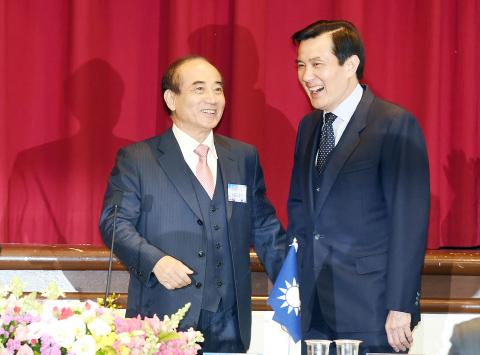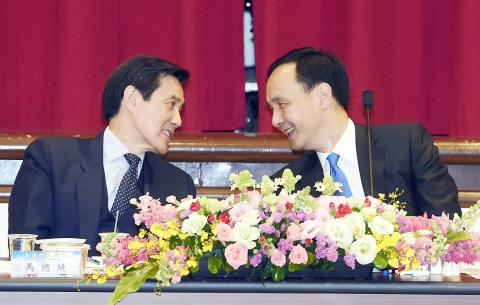Chinese Nationalist Party (KMT) legislators yesterday urged President Ma Ying-jeou (馬英九) to drop his grievances against Legislative Speaker Wang Jin-pyng (王金平) for the sake of party unity ahead of next year’s presidential election.
The plea was made during a meeting of the KMT’s Policy Committee, and came amid internecine strife after KMT Chairman and New Taipei City Mayor Eric Chu (朱立倫) said on Wednesday last week that the party would not pursue further legal action against Wang over his party membership.
Relations came to a head between Ma and Wang when the KMT’s Central Evaluation and Discipline Committee revoked Wang’s membership on Sept. 11, 2013, after he was alleged to have interfered in a judicial case involving an Democratic Progressive Party lawmaker.

Photo: Lo Pei-der, Taipei Times
Wang took the party to court in a bid to retain his membership and thereby his legislator-at-large seat and won in both the Taipei District Court and the Taiwan High Court.
Ma, who had pushed for Wang’s ouster in September 2013, said that he was personally “disappointed and could not condone” Chu’s decision, and did not make his annual appearance at the Pingsi Sky Lantern Festival in New Taipei City.
However, the three men at the center of the discord appeared cordial to each other yesterday. Chu greeted Ma as he arrived for the meeting, while the president took the initiative to shake hands with Wang, a move that drew applause from KMT legislators.

Photo: Lo Pei-der, Taipei Times
“We are happy to be gathered here today and hope that we can all work together on party administration as well as legislative matters to ensure passage of legislation that will benefit the nation and the public,” Chu said.
“The party stands with the public if [the legislation] is beneficial,” he added.
The KMT is a union of ideals and moral righteousness; we must make the public the focus of our thoughts and seek to bravely surmount difficulties, Chu said.
He thanked the KMT lawmakers for their efforts to help pass the budgets and other items during the sixth legislative session of the eighth legislative term.
There are many important issues that will be closely watched in the next legislative session, including constitutional reform, Chu said, adding that the KMT must be responsible in proposing amendments to the Constitution and working together with the Democratic Progressive Party (DPP) on the matter.
“We are one big family. There are bound to be disagreements and different ideas among family members, but we must respect and communicate with each other, seeking to arrive on a consensus for the betterment of the public,” Chu said.
His call to pull together as a family was echoed by others.
KMT Legislator Lo Ming-tsai (羅明財) said the he hoped that “the family” remained at peace and that the “children wished the best of the matters of the adults.”
Lo’s statement drew more applause — and smiles from Ma, Chu and Wang, with Ma making notes.
KMT Legislator Wang Hui-mei (王惠美) said it was great to see everyone together despite media reports of discord, adding that she hoped Chu could expedite the reversal of the party’s lawsuit against Wang.
If parents are always at odds with each other, the is no peace in a family, leading family members to stray from the path or run away, KMT Legislator Lo Shu-lei (羅淑蕾) said.
“Your concerns are not ours,” she told Ma.
Lo said she did not care about the Wang case and was more concerned about whether Ma could focus on issues that would actually benefit the nation and its citizens.
Ma told the meeting that he had “heard the opinions” of his KMT colleagues and that he would do his best in all related matters so the KMT could win more support.
“I have always supported inter-party solidarity and am a firm believer in reforming the KMT,” Ma said.
His adherence to “reform, solidarity, growth and being in power” were key to the KMT making a comeback in 2008, he said, adding that he would continue down that path.
Chu closed the meeting with a baseball metaphor, saying that while each player had his or her own strengths, it took teamwork to be successful.

Tropical Storm Gaemi strengthened into a typhoon at 2pm yesterday, and could make landfall in Yilan County tomorrow, the Central Weather Administration (CWA) said yesterday. The agency was scheduled to issue a sea warning at 11:30pm yesterday, and could issue a land warning later today. Gaemi was moving north-northwest at 4kph, carrying maximum sustained winds near its center of up to 118.8kph and gusts of 154.8kph. The circumference is forecast to reach eastern Taiwan tomorrow morning, with the center making landfall in Yilan County later that night before departing from the north coast, CWA weather forecaster Kuan Shin-ping (官欣平) said yesterday. Uncertainty remains and

SEA WARNING LIKELY: The storm, named Gaemi, could become a moderate typhoon on Wednesday or Thursday, with the Taipei City Government preparing for flooding A tropical depression east of the Philippines developed into a tropical storm named Gaemi at 2pm yesterday, and was moving toward eastern Taiwan, the Central Weather Administration (CWA) said. Gaemi could begin to affect Taiwan proper on Tuesday, lasting until Friday, and could develop into a moderate typhoon on Wednesday or Thursday, it said. A sea warning for Gaemi could be issued as early as Tuesday morning, it added. Gaemi, the third tropical storm in the Pacific Ocean this typhoon season, is projected to begin moving northwest today, and be closest to Taiwan on Wednesday or Thursday, the agency said. Today, there would likely

DISRUPTIONS: The high-speed rail is to operate as normal, while several airlines either canceled flights or announced early departures or late arrivals Schools and offices in 15 cities and counties are to be closed today due to Typhoon Gaemi, local governments announced last night. The 15 are: Taipei, New Taipei City, Taoyuan, Tainan, Keelung, Hsinchu and Kaohsiung, as well as Yilan, Hualien, Hsinchu, Miaoli, Chiayi, Pingtung, Penghu and Lienchiang counties. People should brace for torrential rainfall brought by the storm, with its center forecast to make landfall on the east coast between tonight and tomorrow morning, the Central Weather Administration (CWA) said. The agency issued a sea warning for the typhoon at 11:30pm on Monday, followed by a land warning at 11:30am yesterday. As of

CASUALTY: A 70-year-old woman was killed by a falling tree in Kaohsiung as the premier warned all government agencies to remain on high alert for the next 24 hours Schools and offices nationwide are to be closed for a second day today as Typhoon Gaemi crosses over the nation, bringing torrential rain and whipping winds. Gaemi was forecast to make landfall late last night. From Tuesday night, its outer band brought substantial rainfall and strong winds to the nation. As of 6:15pm last night, the typhoon’s center was 20km southeast of Hualien County, Central Weather Administration (CWA) data showed. It was moving at 19kph and had a radius of 250km. As of 3pm yesterday, one woman had died, while 58 people were injured, the Central Emergency Operation Center said. The 70-year-old